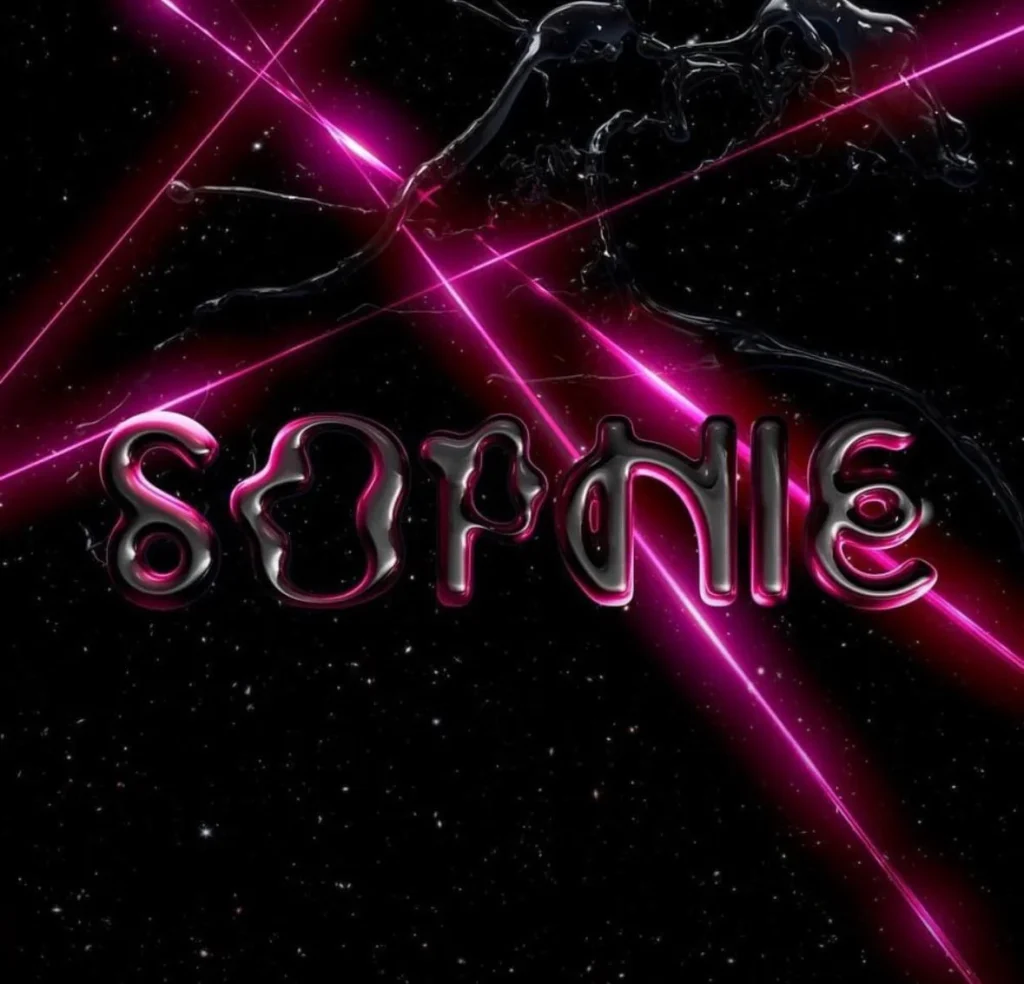“There is a crack in everything, that’s how the light gets in”
As an opener for reviewing the new album from SOPHIE, a quote from Leonard Cohen’s ‘Anthem’ probably isn’t what you were expecting. And that’s fair enough: musically, as you’d imagine, The Future by Leonard Cohen and SOPHIE’s self-titled posthumous album released this week are worlds apart. Still – there is a through line. A conceptual connection, if not a sonic one. Where The Future, the album on which ‘Anthem’ appeared, was a mid-career effort from Cohen, SOPHIE’s self-titled release is very much a bookend – a step beyond finality, even; a collection of songs assembled and finished after her tragic death in 2021. A fact which, necessarily, unavoidably, has led to a finished artefact riddled with the cracks of her absence.
But that isn’t necessarily a bad thing. After all, it’s the cracks that let the light in.
More tangibly, then, the album consists of 16 tracks that were started by SOPHIE prior to her death and which were finished posthumously by her longtime collaborator (and brother) Benny Long. It is, in many ways, not a typical SOPHIE record – if such a thing exists. It is also most certainly not the direct follow-up to the rightly-adored Oil Of Every Pearl’s Un-Insides. And for some that might be disappointing to hear – just like, in truth, for some the record itself will be disappointing to hear.
But, regardless of what fans might want on the one hand, perhaps that’s right – perhaps it’s only proper that SOPHIE ought not to just rollout as if nothing has changed. It has, after all, changed a lot.
Moreover, SOPHIE was and remains a singular artist – not just irreplaceable but inimitable. And to pretend that isn’t the case, that anyone could reasonably presume to take on that mantle and wear it with the same distinction, would be at best a foolish endeavour. At worst, intentionally or not, it would be verging on an insult to her memory and to her legacy.
Instead, then, SOPHIE is a chimera of sorts – it has the markers of SOPHIE’s DNA, both literally and figuratively, but it also clearly has other component parts. Most notably in this sense, there is a feature of some kind listed on every single track – bar the intro, aptly titled ‘The Full Horror’ – featuring an eclectic mix of contributors, from Juliana Huxtable to Kim Petras; Nina Kraviz to Popstar. And it’s worth noting that “contributor” does feel like the right word here, rather than collaborator, the lack of dialogue between artists being so clear cut, so final, and in some cases so outright obvious to the ear.
This feels, in many ways, more like a compilation than a coherent album: a selection of tracks created in tribute to the late artist, rather than a cogent piece of art crafted by her exacting hand. It isn’t so much that this tries and fails to replicate what SOPHIE did best – or, more accurately, what only SOPHIE did – but more that it steers too far away from that, likely (and with good reason) to avoid criticism on that front.
The most recognisable SOPHIEisms – the ticks, the stabbing synths, the ephemeral sound effects – are dialed down throughout or, in some cases, gone altogether. As, of course, is her voice: found so spectacularly on Oil – coming out of nowhere in the same way that Arca announced herself to the wider world so vocally on her self-titled album in 2017 – now lost again. Or, if not lost exactly, then something more like present but preserved; trapped in the amber of time and place, forever as it was.
It’s a difficult thing to accept when considering an artist who thrived not just on evolution but specifically on pushing the very bounds of that evolution – an artist for whom stasis was anathema. And, as a listener on a purely sonic level, it’s a notable absence too, the biggest of those aforementioned cracks, but one that is very much a right decision.
That ‘The Full Horror’, with its dark yet weightless soundscape that shifts across the stereo field, its mechanical clangs, its hallucinatory animal noises and its hypnagogic echoes, sets out the record’s stall – positioning it as something like the original score for a science-fiction horror movie somewhere between Event Horizon and Solaris – immediately brings to mind a feeling of haunted emptiness; not malevolent in any sense, but a feeling of ghosts in the machine. (Interestingly, it also calls into mind a particularly contemporary example of posthumous representation, where the inclusion of a CGI-rendered Ian Holm in the recent Alien: Romulus was rightly viewed as an abomination. Some things, we can all agree, are best left – if not exactly to the past – to live forever as they are, unchanged in the present tense.)
There are, then, ways in which the concept of the void more broadly – and the more acute, yawning absence – becomes the focus of the record in a thematic sense. There being no way (or at least no right way) to reverse engineer SOPHIE’s presence into places that it hasn’t touched, the only choice is to lean into the chasm it has left behind.
Following on from the opener, the next four tracks are a continuation of that theme with that same ominous, almost astronomical sensibility of the unheimlich. ‘Rawwwwww’ with Jozzy is dark, sludgy, and littered with off-kilter clangs – delivering on a discordant dancehall sensibility that puts one in mind of the London-based artist GAIKA – where low-end is pushed to the foreground before dissolving into nothingness without any sense of climax. This is, perhaps, what the vacuum might not just sound like but feel like.
‘Plunging Asymptote’, which features a spoken word contribution from Juliana Huxtable, only doubles down further on this, repeating the phrase, “Plunging asymptote against a white noise more torturous than silence”, backed by a host of sci-fi effects from laser-like synths to trilling scanners, to snare drums with the attack of retro arcade game punches. Huxtable’s delivery is mechanical, but the words themselves are telling – “white noise” and “silence” are concepts that didn’t really figure in SOPHIE’s musical lexicon, after all – describing not the place where she is now, or even the state of the world she has left behind, but rather how things were before she arrived. It’s the void we might have had but were lucky enough to escape.
At the risk of delivering a blow-by-blow on the full 16 tracks, the fourth continues in the same vein: more glistening astral sonics, more spacious this time perhaps and somewhat brighter, instantly recalling Brian Eno’s ‘Always Returning’ from Apollo: Atmospheres And Soundtracks. Once again featuring spoken word throughout – this time courtesy of Nina Kraviz – ‘The Dome’s Protection’ is a sprawling, almost majestic culmination of the album’s feel and its aura up until this point. Kraviz’s words, too, which offer up phrases such as, “The future is discovered at the turn of each pathway”, “Reality is always a construction of the imagination”, “We tamed the future” and – perhaps most fittingly and most poignantly – “Consciousness is a rare and precious thing”, which all chime in a way that borders on sentimental despite their quasi-robotic recital. It’s a stirring piece of music in its own right, but it’s also a distillation of everything SOPHIE created and stood for as an artist – the notion that the mechanical, what might even technically be called the artificial, is not devoid of humanity; that it’s on us to look for that humanity and to find it, rather than presume it isn’t there at all.
It’s a beautiful way to cap off a tribute to an artist sorely missed and whose empathetic talent is perhaps never to be replicated. The problem, though, is that there are 12 more tracks on this record. And, while these don’t undo what was achieved in the first act, the second and third are sorely lacking in comparison.
This also isn’t to say those remaining two acts are bad – that would be a terrible ratio and it would be unfair to everyone involved to even leave that suggestion hanging. It’s more that those remaining songs feel unmoored from the album and from one another – they feel like a collection of singles, brought together to prove SOPHIE’s capabilities as a more mainstream producer and composer. There are huge pop songs – some that might have and may well still make their way to radio – and there are tunes here undoubtedly destined to find a home in clubs across the world. And that’s great. SOPHIE was not a one-trick pony by any means, and she should be remembered as having breadth and depth, and for breathing a sense of honesty into even the most hyper-inflated bubblegum of sonics.
But, that being said, not all of what’s on display here fits the bill. ‘Reason Why’ with Kim Petras and BC Kingdom, for example, is easy on the ears but isn’t much more than that – a superficial slice of something nice with its steel drums, claps, summery synths, and surface-level lyrics like “Our love so big not minimal” and “New York Fashion Week remember us”. It has the same glossy veneer as so much of SOPHIE’s discography, but it doesn’t have that same weird viscosity – it isn’t slick and strange to the touch, doesn’t have that uncomfortable warmth.
And that makes sense, of course, because she isn’t here to provide it. But it all begs the question of whether any of this makes sense – of who it’s really for. And, listening through, you get the distinct impression that this record is for the people who made it – a kind of catharsis; a final chance to be in the moment that they know is never coming back. It’s hard to begrudge them that and there are points – like ‘Do You Wanna Be Alive’ featuring Big Sister, with its pop and pour water noises, its blips, and its abrasiveness – where that’s a moment we can all revel in and share. The same goes for ‘Why Lies’, featuring BC Kingdom and Liz, layered-up with unsettling laughter and stabbing synths in a way that feels genuinely close to the heart of SOPHIE’s art.
It is the unavoidable and unenviable problem of the posthumous album that it is expected to not only show the best of an artist’s work up until a certain point but also to make some proclamation about an imagined future. It should tell us something about what has been and what might have come to pass in another world.
The thing is, though, SOPHIE was the future. In many ways she still is. But that’s something we’ll find out over time – not over the course of these 16 tracks.
Sophie is released this week by Transgressive/ Future Classic




